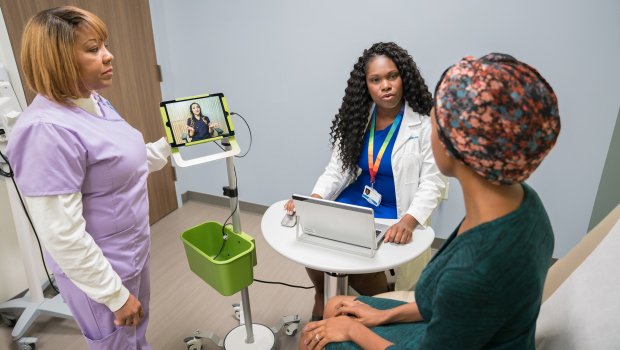Advancing team-based care by learning from high-performing primary care practices nationwide
The challenge
Team-based care is an essential component of high-quality primary care. When patients receive care from well-organized, effective teams, they experience greater satisfaction with both their overall care and their provider. Team-based care also reduces provider and staff burnout and job exhaustion.
Despite evidence that team-based care led to better outcomes for patients and staff, in 2012, there was little guidance on how to create effective teams. To address this challenge, the Robert Wood Johnson Foundation created a national program, The Primary Care Team: Learning from Effective Ambulatory Practices (LEAP), to help primary care practices develop stronger teams by using insights gleaned from in-depth study of high-performing practices. The MacColl Center for Health Care Innovation (now the ACT Center) led the 5-year LEAP program in partnership with Community Health Center, Inc., our LEAP National Advisory Committee, and 30-high performing primary care practices across the country.
The work
The project team selected 30 practices based on descriptions of innovations in team-based care and performance data for quality care measures and patient experience. Each practice hosted a 3-4-day site visit between August 2012 and September 2013 so that our team could:
• Observe team configurations and roles
• Conduct interviews with leadership, staff, and providers
• Shadow patient visits and team meetings
• Collect practice photos, materials, and tools
What we learned
We identified common team roles and functions from the LEAP practices and created the Primary Care Team Guide, a web-based technical assistance program to help other primary care practices build effective teams. The 30 LEAP practices engage health professional and lay staff in patient care to the maximum extent, which enables the practices to meet the expectations of a PCMH and helps free up providers to focus on tasks that only they can perform.
Other learnings include:
- LEAP practices have expanded the roles of existing staff and added new personnel to provide the person power and skills needed to perform the tasks and functions expected of a patient-centered medical home (PCMH).
- LEAP practice teams generally include a rich array of staff, especially registered nurses (RNs), behavioral health specialists, and lay health workers.
- Most LEAP practices organize their staff into core teams, which are built around partnerships between providers and specific Medical Assistants (MAs), and often include RNs and others such as health coaches or receptionists.
- MAs, RNs, and other staff are heavily involved in the planning and delivery of preventive and chronic illness care.
- The care of more complex patients is supported by behavioral health specialists, RN care managers, and pharmacists.
- Standing orders and protocols enable staff to act independently.
Impact
The Primary Care Team Guide synthesizes the learnings from LEAP into a publicly available technical assistance site that supports the development of effective teams. The guide offers primary care practice staff and practice facilitators strategies, resources, and creative ideas for improving team-based care. These tools were used in 3 subsequent learning collaboartives to help support team-based care in Colorado, California, and nationally. LEAP also developed a program to train emerging leaders identified through the site visits. The project informed subsequent work with the Agency for Healthcare Research and Quality to delineate specific staffing models based on the characteristics of a practice’s patient panel, and informed the design and execution of Healthy Hearts Northwest.
Featured publications
Crabtree BF, Howard J, Miller WL, Cromp D, Hsu C, Coleman K, Austin B, Flinter M, Tuzzio L, Wager EH. Leading Innovative Practice: Leadership Attributes in LEAP Practices. Milbank Quarterly. May 2020. doi.org/10.1111/1468-0009.12456. Full text
Wagner, EH, Flinter M, Hsu C, Cromp D, Austin BT, Etz R, Crabtree B, Ladden M. Effective team-based primary care: observations from innovative practices. BMC Fam Pract 18, 13 (2017). Full text
Ladden MD, Bodenheimer T, Fishman NW, Flinter M, Hsu C, Parchman M, Wagner EH. The Emerging Primary Care Workforce: Preliminary Observations From the Primary Care Team: Learning From Effective Ambulatory Practices Project. Acad Med. 2013;88(12):1830–4. doi: 10.1097/ACM.0000000000000027. PubMed
PROJECT SNAPSHOT
FUNDER
Robert Wood Johnson Foundation
PARTNERS
Community Health Center, Inc.
National Advisory Board
30 high-performing primary care practices
KEY CONTRIBUTIONS
Training
Practice facilitation
Evidence synthesis and translation
Tool development
PROJECT LEAD
Ed Wagner
Margaret Flinter
